-
 Art of Wellness Acupuncture & Traditional Chinese Medicine (TCM)11704 Wilshire Blvd, Suite 295, Los Angeles, CA, 90025
Art of Wellness Acupuncture & Traditional Chinese Medicine (TCM)11704 Wilshire Blvd, Suite 295, Los Angeles, CA, 90025
myartofwellness@gmail.com310-451-5522 Office Hours
MonClosedTue7:30 am --4 pmWed7:30 am --4 pmThu7:30 am -- 4 pmFri7:30 am -- 4 pmSat7:30 am -- 4 pmSunClosedOur office opens from Tuesdays to Saturdays 7:30 am to 4 pm, will be closed on Memorial day, Independent day, Labor day, Thanksgiving day, Christmas and New year.
-
Recent Posts
- How to Treat Rosacea With Acupuncture and TCM
- How to Treat Perioral Dermatitis With Acupuncture and TCM
- Lymphatic Drainage With Acupuncture and TCM
- How to Treat Turf Toe With Acupuncture
- How to Treat Nerve Pain With Acupuncture and TCM
- How to Treat Watery Eyes With Acupuncture and TCM
- How to Treat Ovarian Cysts With Acupuncture and TCM
- How to Treat Dystonia With Acupuncture and TCM
- Can Acupuncture Help Bad Breath?
- How to Treat Atopy with Acupuncture and TCM
- Plantar Fasciosis Treatment With Acupuncture and TCM
- How to Protect Yourself When Air Quality Is Poor
- How to Treat Spinal Headache With Acupuncture and TCM
- How to Treat Sarcoidosis With Acupuncture and TCM
- How to Treat Flu With Acupuncture and TCM
- Chinese New Year 2025 Year of the Snake
- Sign up to receive news and updates and get my free report:“The Top 10 Reasons to Try Acupuncture”

July 2025 M T W T F S S 1 2 3 4 5 6 7 8 9 10 11 12 13 14 15 16 17 18 19 20 21 22 23 24 25 26 27 28 29 30 31
Women’s Health
How to Treat Ovarian Cysts With Acupuncture and TCM
By Xiaomei Cai, L.Ac., Ph.D. and Qineng Tan, L.Ac. Ph.D.
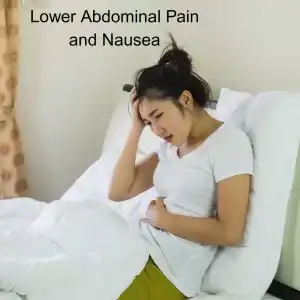
Sharp pain lower abdomen? Feeling bloated or heavy? Pain during intercourse? These can all be signs of an ovarian cyst. Acupuncture and TCM can help relieve pain in lower left abdomen or sharp pain lower right abdomen, while also addressing the root cause of ovarian cysts.
Ovarian cysts are fluid-filled sacs that develop on or within an ovary. These cysts are quite common and often form naturally during the menstrual cycle. While many ovarian cysts are harmless and resolve on their own without causing symptoms, some can lead to pain and may indicate underlying health issues.
TCM has centuries-old methods of helping to regulate women’s hormonal health and offers natural solutions for reproductive care, especially focusing on ovarian health.
Symptoms of Ovarian Cysts
Many people may have ovarian cysts without knowing it, because they do not always cause painful symptoms. However, sometimes a cyst can cause a lot of pain, or may cause pain and bloating that comes and goes during different phases of the menstrual cycle, or due to other factors.
- Pelvic Pain, dull or sharp ache in the lower abdomen, often on one side: ache in lower left abdomen, lower left hand abdominal pain, pain in lower right abdomen.
- Bloating, feeling of fullness or heaviness in the abdomen.
- Pain During Intercourse, discomfort during sexual activity.
- Menstrual irregularities, unusual bleeding patterns, including heavier or lighter periods
- Frequent urination, increased urge to urinate due to pressure on the bladder.
- Constipation, difficult bowel movements.
- Nausea, vomiting, especially if a cyst causes the ovary to twist (ovarian torsion)
Ovarian Cyst Diagnosis and Treatment
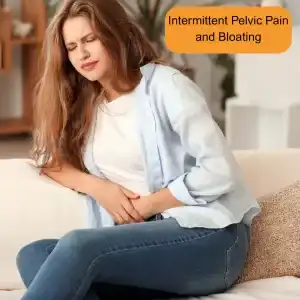
In Western medicine, ovarian cysts are typically diagnosed through a pelvic examination followed by imaging studies such as ultrasound, which helps determine the cyst’s size, shape, and composition. Additional tests like blood work may be conducted to assess hormone levels or rule out malignancy.
Sometimes the ovary and/or fallopian tube becomes twisted and is pulling on surrounding tissues; this is called ovarian torsion. This cuts off circulation to the ovary, which not only can cause severe pain, but can lead to the “death” of the ovary. This is a serious condition, which requires surgery to untwist or remove the ovary and sometimes the fallopian tube.
When there is no ovarian torsion, the treatment for a cyst will usually involve a wait and see approach, monitoring the cyst over time to see if it resolves naturally, especially if it’s small and asymptomatic.
Hormonal contraceptives may be prescribed to prevent the formation of new cysts, though they won’t shrink existing ones.
In cases where cysts are large, persistent, or causing significant discomfort, surgical removal may be recommended. Procedures range from minimally invasive laparoscopic surgery to more extensive laparotomy, depending on the cyst’s characteristics and suspicion of malignancy.
TCM and acupuncture offer alternative approaches to treating ovarian cysts, focusing on restoring balance.
Can Acupuncture Help Ovarian Cysts?
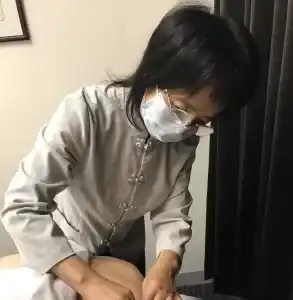
If you are experiencing serious pain in the left lower quadrant or right lower quadrant, it is important to seek urgent medical care and diagnostics, because ovarian torsion can, in some cases, lead to a rupture and even possibly life-threatening sepsis.
However, in many cases, an enlarged cyst can be helped with complementary therapy with acupuncture and other TCM treatment for cysts.
In TCM, we do not just look at treating the symptoms of a cyst that has already formed. We dig deeper to look at the reasons why cysts are developing on the ovaries. Acupuncture offers a multifaceted approach to treating ovarian cysts by addressing underlying imbalances and promoting the body’s natural healing processes.
A comprehensive treatment protocol for ovarian cysts may include:
- Electro-Acupuncture: By identifying the precise location of the cyst through palpation or medical imaging, practitioners can apply electro-acupuncture directly to the affected area. This involves inserting needles into specific abdominal and lower back points and administering electrical stimulation for approximately 30 minutes, aiming to reduce the cyst’s size and alleviate associated symptoms.
- Meridian Point Stimulation: Targeting points along the Liver and Gall Bladder meridians helps to relieve stagnation and promote the smooth flow of Qi. Additionally, points will be used to address dampness and phlegm accumulation, which are often associated with cyst formation.
- Auricular Acupuncture: Placing a tiny seed or needle to target acupoints in the ear can help support reproductive organ health and balance hormonal levels.
In addition to acupuncture, Chinese herbal medicine plays a crucial role in the treatment of ovarian cysts. Specific herbs are known for their properties in invigorating blood circulation and resolving phlegm stagnation. These herbs can be integrated into formulas tailored to the individual’s specific pattern of disharmony, considering factors like Spleen dampness, Liver Qi stagnation, and internal heat.
Implementing lifestyle modifications is also essential in managing and preventing ovarian cysts. Your acupuncture practitioner will talk with you in-depth about dietary changes that may help combat Spleen dampness. Meditation and movement practices like Qi Gong and Tai Qi can help alleviate stress and promote the smooth flow of Qi. Some simple changes in physical habits, like crossing the legs or walking with pronated feet can help with contribute to Qi stagnation in the pelvic region.
By integrating these acupuncture techniques, herbal remedies, and lifestyle adjustments, Traditional Chinese Medicine offers a holistic and individualized approach to treating ovarian cysts, aiming to restore balance and promote overall reproductive health.
Acupuncture Near Me for Ovarian Cysts in West Los Angeles
Acupuncture treatment can help relieve the pain of ovarian cysts as well as help balance hormones and organ system health, so that cysts don’t keep coming back again. If you are experiencing any menstrual pain, PCOS or infertility issues, please do not hesitate to come in for a consultation. Dr. Cai is a reproductive health specialist, with training in both TCM and Western gynecological medicine. She has helped many hundreds of people here in Los Angeles with women’s health issues of all kinds.
*This article is for education from the perspective of Traditional Chinese Medicine only. The education provided by this article is not approved by FDA to diagnose, prevent, treat and cure human diseases. It should not stop you from consulting with your physician for your medical conditions. Traditional Chinese Medicine is based on Qi, which is an invisible force that usually cannot be observed by modern science. Because science focuses on testing ideas about the natural world with evidence obtained through observation, these aspects of acupuncture can’t be studied by science. Therefore acupuncture and Chinese herbs are often not supported by double-blind, randomized trials, and they are considered alternative medicine therapies in the United States.
How to Treat Pelvic Congestion Syndrome With Acupuncture and TCM
By Xiaomei Cai, L.Ac., Ph.D. and Qineng Tan, L.Ac., Ph.D.
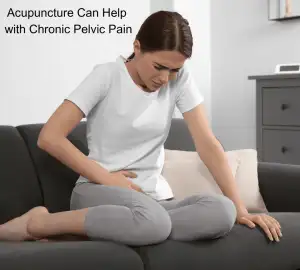
Pelvic pain that gets worse after standing for a long time? Urinary pain and urgency? Lower back pain and sciatica? Bloated stomach after eating? These can all be symptoms of pelvic congestion syndrome (PCS), or vaginal varicose veins. Acupuncture and TCM offer an alternative treatment for pelvic congestion syndrome.
What is Pelvic Congestion Syndrome (PCS)?
Pelvic Congestion Syndrome (PCS) is a chronic condition caused by varicose veins in the pelvis—similar to varicose veins that commonly occur in the legs. These dilated veins in the pelvis can cause severe pelvic pain, particularly a feeling of heaviness or aching pain that worsens over the day. PCS pain can often get worse after standing for long periods.
Pelvic congestion is one of the most common causes of chronic pelvic pain, but PCS often goes undiagnosed because the symptoms can mimic other conditions, such as:
- Endometriosis
- uterine fibroids/leiomyoma of the uterus
- bladder pain/interstitial cystitis
- ovarian cysts
- Generalized back pain, lower back pain, hip pain, or groin pain
All of these conditions can cause chronic pain in the pelvic area.
In Pelvic Congestion Syndrome, dilated veins around the ovaries and the vulvovaginal can happen due to venous obstruction, problems with valves in the blood vessels, and/or changes in hormone levels.
PCS does not only affect women. Men can also suffer from pelvic congestion syndrome and experience chronic pelvic pain.
Pelvic pain conditions related to vascular issues and blood flow are complicated. Most health conditions related to pelvic pain in relation to reproductive organs, and in particular CPS, are still not very well understood by modern medicine.
TCM offers a holistic approach to reproductive healthcare. Acupuncture treatment can help address the many factors involved in pelvic congestion syndrome.
Top 10 Pelvic Congestion Syndrome Symptoms
PCS symptoms can vary from patient to patient, but the most common signs of PCS include:
- Pelvic pain that gets worse as the day goes on. Discomfort tends to accumulate as the day progresses due to the pooling of blood in the pelvic veins, leading to increased pressure.
- Pelvic pain that worsens when standing for long periods. Many women report that standing for extended periods increases the feeling of pressure and pain in the pelvic region.
- Pelvic pain after eating, abdominal pain after meals. Eating can trigger pain and bloating, making meals uncomfortable.
- Urinary incontinence, an inability to control urination, especially when coughing or lifting something heavy.
- Painful urination (urinary pain),burning during urination, often confused with a UTI (urinary tract infection).
- Urinary urgency, sudden need to urinate, sudden, intense urge to urinate, which can feel similar to bladder conditions.
- IBS symptoms, alternating constipation and diarrhea, bloating, and abdominal pain.
- Lower back pain, radiating pain in the lower back, often mistaken for sciatica or musculoskeletal problems.
- Throbbing in the legs, achy legs after standing for a long time, poor circulation in the lower extremities, causing aching, swelling, and throbbing in the legs.
- Painful intercourse (dyspareunia), pain during or after sex due to the increased pressure and swelling of the pelvic veins.
What Does Pelvic Congestion Pain Feel Like?
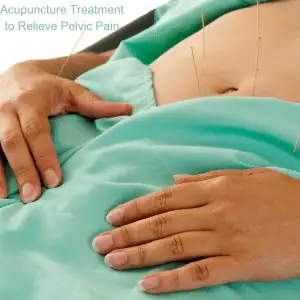
Pelvic Congestion Syndrome (PCS) and Chronic Pelvic Pain Syndrome (CPPS) are two conditions that cause debilitating pain in the pelvic region, yet they are distinct in the way they present.
Pelvic Congestion Syndrome (PCS) is primarily caused by varicose veins in the pelvis, leading to blood pooling in the veins and creating chronic pelvic pain, particularly in women of childbearing age. PCS pain tends to worsen after long periods of standing, physical activity, or after sexual intercourse.
PCS is often associated with hormonal changes and pregnancy, but it is also underdiagnosed because the symptoms can overlap with other pelvic disorders besides pregnancy.
Diagnostic tools like Doppler ultrasound or venography are often needed to identify the underlying venous issues, which may be treated with hormone therapy, vein embolization, or surgery.
Medications that suppress estrogen may be prescribed to help relieve symptoms. These include Depo-Provera, Implanon, or Goserelin. These are all drugs that also prevent pregnancy, so they are not helpful for people who may be hoping to get pregnant, or who want or need to avoid taking hormonal birth control for whatever reason.
Ovarian vein embolization is a procedure that blocks or ties off veins so that blood isn’t flowing or pooling in areas of the pelvis.
Acupuncture offers an natural treatment for pelvic congestion syndrome, without side effects of hormonal birth control.
Can Acupuncture Help Pelvic Congestion Syndrome?
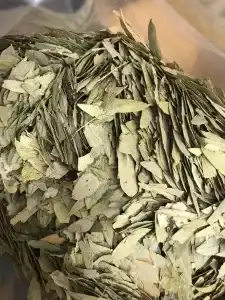
Traditional Chinese Medicine (TCM), particularly acupuncture, can be an effective modality for treating conditions like Pelvic Congestion Syndrome (PCS) and Chronic Pelvic Pain Syndrome (CPPS).
Acupuncture has been widely adopted in both Eastern and Western countries for managing pain syndromes. The central mechanism behind acupuncture’s effectiveness in these cases is its ability to stimulate specific acupoints, improving local blood circulation and reducing inflammation, which ultimately helps in alleviating pain.
The muscles and fascia inside the pelvis play a crucial role in maintaining the stability of the pelvis and spine. The fascia in the pelvis can be compromised by trauma, postural stress, pregnancy, anxiety, and other subtle factors.
This is one of the reasons the pelvic pain and congestion can be difficult for conventional medicine to address properly. Visceral pain in the pelvic may not be easily “visible,” as it can be caused by microtraumas, adhesions, scar tissue, and pain referring from one area to another.
Acupuncture treatment can help relieve this type of pain, as placing needles in acupoints has an analgesic, as well as a calming, effect.
Research has demonstrated that acupuncture can release certain neurochemicals like adenosine, which exerts an analgesic effect during stimulation of acupoints, offering relief from pain in conditions like CPPS. This mechanism helps reduce inflammation and regulate pain by influencing inflammatory mediators, which play a significant role in chronic pelvic pain disorders.
Clinical trials have specifically shown that acupuncture improves symptoms in both men and women suffering from CPPS, with better outcomes than placebo or sham treatments.
One study looked at male patients with pelvic pain and venous congestion. After five weekly sessions of acupuncture treatment, patients reported significant reduction in pain, and MR venography showed reduction in intrapelvic venous congestion.
Specific formulations of Chinese herbs have been developed to help address the root cause of pelvic congestion, while also relieving painful symptoms.
Acupuncture’s ability to relieve pain through modulation of inflammatory processes makes it an excellent alternative or complementary therapy for chronic pelvic pain conditions.
Acupuncture Near Me for PCS in West LA
At Art of Wellness Acupuncture and TCM in Santa Monica, we have over 35 years of experience helping people with all kinds of chronic pain conditions. We offer highly specialized care for people experiencing reproductive issues, pregnancy, pelvic pain, referred back pain, lower back pain, hip pain, and groin pain. Our team of practitioners spend time with each patient to provide holistic care that takes the whole person into account: physical, mental, and emotional. If you or someone you know is experiencing chronic pelvic pain, please do not hesitate to reach out to us.
*This article is for education from the perspective of Traditional Chinese Medicine only. The education provided by this article is not approved by FDA to diagnose, prevent, treat and cure human diseases. It should not stop you from consulting with your physician for your medical conditions. Traditional Chinese Medicine is based on Qi, which is an invisible force that usually cannot be observed by modern science. Because science focuses on testing ideas about the natural world with evidence obtained through observation, these aspects of acupuncture can’t be studied by science. Therefore acupuncture and Chinese herbs are often not supported by double-blind, randomized trials, and they are considered alternative medicine therapies in the United States.
How To Treat Pelvic Pain With Acupuncture and TCM
By Xiaomei Cai, L.Ac., Ph.D. and Qineng Tan, L.Ac., Ph.D.

Abdominal pain or groin pain? Painful urination or menstrual pain? Bloated stomach? Pain during sex or pain after sex? These can be signs of an inflamed pelvis, or chronic pelvic pain syndrome (CPP or CPPS). Acupuncture and TCM offer a way to treat many different causes of pelvic pain.
Pelvic pain is often related to problems with the reproductive organs (uterus or ovaries). Sometimes it can be due to a pelvic infection, pelvic congestion syndrome, or pelvic inflammatory disease. In other cases, chronic pelvic pain can be caused by problems with the digestive tract or urinary system.
Determining the cause of pelvic pain and finding an effective treatment can sometimes be challenging. TCM and acupuncture offer a holistic approach to treating pelvic pain.
Top 10 Causes of Pelvic Pain
Pelvic pain can arise from a multitude of conditions, each presenting its own set of symptoms.
Common causes of occasional or intermittent pelvic pain are menstrual cramps and ovulation pain (mittelschmerz).
Various types of pelvic pain are associated with pregnancy, as well, particularly hip pain, groin pain and pressure, bladder pressure, and uterus pain.
A gallbladder attack can cause severe pelvic pain.
These are some of the most common causes of chronic pelvic pain in women or AFAB:
- Endometriosis: This condition occurs when tissue similar to the lining of the uterus grows outside of the uterus, causing severe menstrual pain, pelvic pain, pain during intercourse, and fertility issues.
- Ovarian Cysts: These fluid-filled sacs can develop on the ovaries, often leading to bloating, pelvic pain, and discomfort during bowel movements.
- Kidney Stones: Hard mineral deposits in the kidneys can cause excruciating pain in the lower abdomen and groin, painful urination, and blood in the urine.
- Uterine Fibroids: These non-cancerous growths in the uterus can cause heavy menstrual bleeding, pelvic pressure or pain, and frequent urination.
- Pelvic Inflammatory Disease (PID): An infection of the female reproductive organs that causes lower abdominal pain, fever, unusual discharge, and pain during intercourse or urination.
- Urinary Tract Infection (UTI): Infections in the urinary system can cause pelvic pain, a burning sensation during urination, frequent urination, and cloudy urine.
- Interstitial Cystitis (IC): A chronic bladder condition causing bladder pressure, pelvic pain, and a frequent need to urinate.
- Diverticulitis: Inflammation or infection of small pouches that can form in the intestines, leading to severe abdominal pain, fever, and digestive issues.
- Colitis: Inflammation of the colon, often causing abdominal pain, diarrhea, and bloating.
- Irritable Bowel Syndrome (IBS): A gastrointestinal disorder that leads to cramping, abdominal pain, bloating, gas, and diarrhea or constipation.
Sometimes pelvic pain can be caused by muscles or ligaments, such as tightness or spasms in the pelvic floor.
Pelvic adhesions, scar tissue, or fascia in the pelvic region can cause pelvic pain and inflammation.
Generalized pain disorders like fibromyalgia or ME/CFS, can flare up in the pelvic area.
For some people, PTSD and other mental health conditions can trigger pelvic pain.
Typically, medical treatment for pelvic pain involves the use of NSAIDs, or pain medication, to help relieve symptoms. Sometimes doctors will prescribe antidepressant medications or opioids to deal with persistent pelvic pain.
In some cases, physical therapy, such as pelvic floor therapy, may be recommended.
TCM and acupuncture offer an effective alternative treatment for pelvic pain.
Can Acupuncture and TCM Help Pelvic Pain?
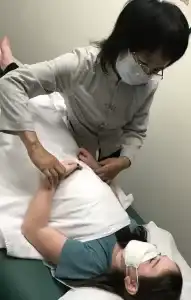
It can be difficult to find relief from pelvic pain. Many conditions that cause pain in the pelvis and reproductive organs are often overlooked by medical practitioners. For example, many women and AFAB suffer for years before finally getting a diagnosis for endometriosis.
Pelvic Pain in Women and AFAB
In Traditional Chinese Medicine (TCM), pelvic pain conditions like endometriosis are viewed as imbalances within the body’s organ systems, particularly the liver and kidney.
Dysmenorrhea, or painful menstruation, is often linked to Qi and blood stagnation, potentially caused by pathogenic factors such as cold and dampness, as well as emotional stress leading to liver stagnation. Acupuncture and herbal treatments aim to restore balance by promoting the flow of Qi and blood, influencing hormone production naturally.
Studies have shown that acupuncture can significantly reduce menstrual pain and regulate cycles, with high success rates and low recurrence when used consistently over time. Herbal remedies further support this process by providing essential nutrients and reducing inflammation.
Acupuncture and TCM have proven effective in treating various pelvic pain conditions, including uterine fibroids and PCOS. Clinical research demonstrates that acupuncture reduces prostaglandin levels, alleviating cramps and regulating the menstrual cycle. Techniques such as electroacupuncture and auricular acupuncture have shown high efficacy in managing dysmenorrhea (painful periods).
Urinary Pain Relief with TCM
In Traditional Chinese Medicine (TCM), the bladder’s function is closely connected to the kidney and spleen, which supply yang energy to warm and support the bladder. Deficiency in Kidney Qi, often due to prolonged illness or repeated untreated urinary tract infections (UTIs), can weaken the bladder, making it unable to hold urine effectively. This can also lead to bladder contraction and increased sensitivity.
Painful urination may arise from physical trauma, such as difficult childbirth, which impacts both physical and emotional health. Additionally, emotional distress can cause stagnation of Liver Qi, particularly if it leads to excess heat, further disrupting bladder and pelvic floor functions.
When treating interstitial cystitis (IC), an acupuncturist assesses a range of symptoms to determine the underlying causes of bladder pain. For example, fatigue, tinnitus, and cold extremities indicate Kidney Yang deficiency, while symptoms like constant thirst, allergies, warm hands, and anxiety suggest excess Kidney Yang heat.
Treatment protocols typically include acupuncture to alleviate bladder pain and balance organ system functions, supplemented by techniques like moxibustion and electro-acupuncture. Studies have shown that regular acupuncture sessions can significantly reduce urinary frequency and alleviate pelvic pain symptoms.
Pelvic Pain Colitis
In TCM, colitis and ulcerative colitis are viewed as conditions caused by imbalances that lead to heat, dampness, or blood stasis in the large intestine. TCM treatments focus on using acupuncture and herbs to reduce inflammation, clear heat, and eliminate dampness. Acupuncture points are selected to relieve symptoms like pain, bloating, and diarrhea.
For diverticulitis, TCM emphasizes diagnosing the root causes of symptoms such as abdominal pain, nausea, constipation, and diarrhea. According to TCM theory, these symptoms can be linked to stagnant Qi or blood and pathogenic forces like dampness, heat, or cold. Treatment often involves strengthening the spleen to improve nutrient absorption and energy conversion, which is crucial for resolving diarrhea and other digestive issues. Acupuncture and moxibustion are used to relieve symptoms, reduce inflammation, and boost immune function. Dietary changes, guided by TCM principles, are also essential to address excess heat or dampness in the gastrointestinal system and maintain overall health.
Pelvic Pain Kidney Stone
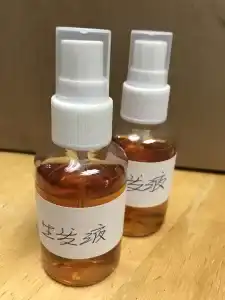
In TCM, kidney stones fall under the category of “Shilin” conditions, characterized by difficult urination. Herbal medicines are used to balance electrolyte minerals, which helps prevent stone formation in the urinary tract.
Acupuncture provides an anesthetic effect, helping to relieve the intense pain associated with kidney stones while other treatments work to reduce and prevent new stone formation. Acupuncture and acupressure can alleviate severe pelvic pain caused by various urinary and reproductive system conditions, as well as reduce anxiety and depression associated with severe pain.
Not only is acupuncture an effective modality for treating pain conditions, but many people find emotional relief, too, when a practitioner is willing to listen carefully and validate their experience. Drs. Cai and Tan at Art of Wellness have over 35 years of experience helping patients with all types of pain. Their caring and attentive bedside manner goes a long way towards helping patients feel more comfortable and confident in their own ability to heal.
Acupuncture for Pelvic Pain Near Me in West Los Angeles
At Art of Wellness near Santa Monica, Dr. Cai has unique expertise in treating women’s health issues of all kinds, including menstrual pain, female infertility, PCOS, and endometriosis. With acupuncture, herbal medicine, and nutrition, our acupuncture practitioners are able to help people find relief from pelvic pain of all kinds.
*This article is for education from the perspective of Traditional Chinese Medicine only. The education provided by this article is not approved by FDA to diagnose, prevent, treat and cure human diseases. It should not stop you from consulting with your physician for your medical conditions. Traditional Chinese Medicine is based on Qi, which is an invisible force that usually cannot be observed by modern science. Because science focuses on testing ideas about the natural world with evidence obtained through observation, these aspects of acupuncture can’t be studied by science. Therefore acupuncture and Chinese herbs are often not supported by double-blind, randomized trials, and they are considered alternative medicine therapies in the United States.
How to Treat Ovulation Pain With Acupuncture and TCM
By Xiaomei Cai, L.Ac., Ph.D. and Qineng Tan, L.Ac., Ph.D.
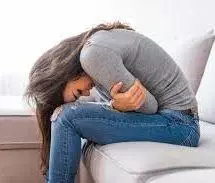
Cramping during ovulation, ovary pain, ovulation pain on one side? Ovulation cramps are very common. Acupuncture and TCM can help ease severe ovulation pain and help with all kinds of ovulation disorders.
The medical term for ovulation pain is “Mittelschmerz,” which means “middle pain” in German. The term Mittelschmerz syndrome refers to the fact that ovulation cramps occur in the middle of the menstrual cycle, typically about 14 days before the next menstrual period.
Studies have suggested that 35-50% of people who ovulate experience cramping during ovulation. Other ovulation symptoms include:
- Ovulation pain on one side
- Pelvic pain, abdominal pain
- Dull ache or sharp twinge of pain in pelvis
- Vaginal pain during ovulation, vaginal cramps
- Cervical cramps, cervix cramps, cervical pain
- Pain around or near the tailbone, tailbone pain
- Back pain, hip pain, or rib pain
- Bloating, bloated stomach
- Fatigue
- Breast tenderness
- Mood swings
- Spotting
- Nausea
- Diarrhea
- Lack of appetite
The process of ovulation involves luteinizing hormone (LH) stimulating follicles on the ovary to mature then break free from the ovary and move through the fallopian tube.
Follicles are like small cysts which stretch the surface of the ovary and then rupture. Blood and other fluids may be released, and this may be part of what causes pelvic pain during ovulation.
Estrogen levels are usually at their highest at the time of ovulation, which can contribute to water retention and uncomfortable bloating in the pelvic area.
For people who are trying to get pregnant, ovulation pain and fertility—or ovulation pain and pregnancy success—may seem related, because the cramping lets them know when they are most fertile.
Many people never notice any signs of ovulation if they aren’t specifically watching for them. For some, ovary pain during ovulation is a sharp cramp that only lasts a few minutes, or a few hours. For others, ovulation pain and pelvic cramps can be so severe that they are debilitating.
Acupuncture and TCM treatment can help relieve ovulation cramps and help regulate hormones to alleviate other ovulation symptoms and problems, as well.
What Causes Ovulation Pain?
Why do some people experience more severe ovulation pain than others? Medical science has not determined exactly why some people experience pain during ovulation and others don’t.
Sometimes ovulation pain can be so bad that people go to the emergency room. In this case, doctors will want to rule out other possibilities. Many conditions can cause pelvic pain, including:
- Appendicitis
- Constipation
- UTI
- IBS
- Celiac disease
- Interstitial cystitis
- Kidney stones
- Gallbladder attack
- Ulcer
- STIs
- Bowel obstruction
- Hernia

Pelvic pain that is related to the reproductive organs can include:
- Menstrual cramps, PMS, dysmenorrhea, painful periods
- Ovarian cyst, ruptured ovarian cyst, twisted ovarian cyst
- Endometriosis
- Uterine fibroids, leiomyoma of the uterus
- Pregnancy
- Ectopic pregnancy
- Pelvic inflammatory disease
- Scar tissue in the pelvic area
- Cancers of the reproductive organs
These conditions not only cause pain, but may interfere with fertility if and when you are ready to conceive.
Endometriosis Ovulation Pain or Ovarian Cyst Pain?
Ovary pain may be related to other issues, apart from ovulation.
Some women begin to experience more ovulation pain when they are going through perimenopause, due to changing estrogen levels.
Ovarian cysts—sacs filled with fluid that develop on the ovaries—are very common. These usually form during ovulation and then go away on their own. However, in some instances, they grow larger, and can cause considerable pain.
Signs of ovarian cyst may be a constant ache, or one that comes and goes, or sudden, sharp pains that happen occasionally. Other ovarian cyst symptoms include: bloating, swelling, and pressure in the pelvic area. If the cyst ruptures, there may be a very sudden, severe pain on one side, and if the cyst becomes twisted or torqued, there may be severe pain accompanied by nausea or vomiting.
Polycystic ovarian syndrome (PCOS) is a hormonal condition in which a person does not ovulate regularly. In many cases, lots of small cysts form on the ovaries, which can cause bloating and pelvic pain.
Ovulation pain can be differentiated from PCOS or ovarian cyst pain mainly by the fact that it occurs only during a specific window of time during the ovulation cycle. If you are using a fertility calculator (ovulation calculator) to track your cycle, then you may be more aware of how your ovulation cycle works and when your fertile window is going to occur.
Endometriosis is a condition in which uterine lining tissues develop in other areas of the body, particularly on the ovaries and fallopian tubes. One of the primary symptoms of endometriosis is pelvic pain, which can be severe and happen at any time during the menstrual cycle. Some people report increased pain during ovulation, as well as severe menstrual pain.
Endometriomas (also known as “chocolate cysts”) can develop in and around the ovaries. There can also be scar tissues, or adhesions, around the ovaries. These tissues may contribute to the increased pain ovulation can cause when you have endometriosis. In these cases, the pain may radiate to other areas, even down to the thighs. Having sex may also be painful around the time of ovulation.
It is important to consult with a health professional if you are experiencing ovary pain, vaginal pain or severe menstrual pain.
PCOS and endometriosis not only cause pain and other uncomfortable symptoms, but can lead to infertility.
If your periods are irregular, or you have reason to suspect that you are not ovulating, it is important to seek health care. Severe pain or missed periods may be sending a signal that there is a deeper issue that needs to be addressed.
Treatment for Ovulation Pain
Ovulation pain may not occur every month. Some people may get relief from occasional ovulation pain by taking over the counter pain relievers like ibuprofen.
If ovary pain is happening frequently and is unbearable, a doctor may recommend hormonal birth control, like oral contraceptives or the Nuvaring. These birth control methods suppress ovulation, and therefore prevent mittelschmerz. However, hormonal birth control can have other negative side effects, and is not suitable for those who may be trying to get pregnant.
Can Acupuncture Help Ovulation Pain?

In TCM, we see ovulation as being a transition from Yin dominant energy to Yang dominant energy. The Yin energy has built up to the point when the egg is released, then Yang energy warms the uterus to prepare it for potential conception.
If there is stagnant Qi (life force energy) in the organ systems, this can cause the intense cramps some people experience during ovulation.
Acupuncture treatment, herbs, and the right nutrition can help move Qi and blood. The smooth flow of Liver Qi, in particular, is essential to not only enhance fertility, but to help ovulation and menstruation occur without blockages that cause pain.
Acupuncture and Chinese herbs have been shown to help relieve all types of gynecologically related pelvic pain, including endometriosis pain, menstrual pain, and period back pain.
Acupuncture treatment has a natural effect on the key hormones involved in follicle development, ovulation, and menstruation: estrogen, progesterone and prostaglandins. Balancing these hormones can help to regulate ovulation when it is not occurring, and also to help relieve cramps, tension, and other symptoms.
Top 3 Acupressure Points for Ovulation Pain
Here are some acupoints for ovulation cramps that you can use to help relieve pelvic pain.
- “Sea of Qi” CV6 – 1-2 inches below belly button, massage in a circular motion for at least a minute
- San Jiao Jiu CA6- 2 points that make a triangle with the navel, press firmly
- Zigong Ren Channel 3 – 4-5 inches below the belly button, press firmly for a minute
Acupuncture Near Me for Ovulation Pain
Whether you are experiencing monthly ovulation cramping, not sure when or if you are ovulating, or suspect that you may have PCOS, endometriosis, or fibroids, TCM and acupuncture offer a highly effective alternative treatment for gynecological issues. The doctors at Art of Wellness are highly respected experts when it comes to fertility treatment and women’s health. Their unique knowledge of Western gynecology and obstetrics combined with TCM allows them to work with you and your individual situation.
*This article is for education from the perspective of Traditional Chinese Medicine only. The education provided by this article is not approved by FDA to diagnose, prevent, treat and cure human diseases. It should not stop you from consulting with your physician for your medical conditions. Traditional Chinese Medicine is based on Qi, which is an invisible force that usually cannot be observed by modern science. Because science focuses on testing ideas about the natural world with evidence obtained through observation, these aspects of acupuncture can’t be studied by science. Therefore acupuncture and Chinese herbs are often not supported by double-blind, randomized trials, and they are considered alternative medicine therapies in the United States.
How to Treat Dysmenorrhea With Acupuncture and TCM
By Xiaomei Cai, L.Ac., Ph.D. & Qineng Tan, L.Ac., Ph.D.

Menstrual cramps, unbearable period pain? Severe period cramps and period back pain are dysmenorrhea symptoms. Acupuncture and TCM offer a way to help with cramps and provide period cramp relief.
About 80% of women report having menstrual cramps and painful periods at some point in their lives. Over 40% of women regularly experience PMS cramps, or cramps before period. For some women, the pain is mild enough to tolerate. For others, severe period cramps are truly debilitating, leading to missed days of school or work.
Primary dysmenorrhea is when the period cramps are a result of prostaglandins (hormones) causing the uterus to contract forcefully to expel its lining. For some people, this action leads not only to pelvic pain, but can radiate to cause severe lower back pain, hip pain, or even pain in the legs.
Secondary dysmenorrhea is when severe menstrual cramps are related to another condition, such as endometriosis, uterine fibroids, or pelvic inflammatory disease (PID). About 1 in 10 women between the ages of 15-49 experiences endometriosis, which can cause excruciating pelvic pain during period, and negatively impact fertility. As many as 60-80% of women have fibroids, although many do not know it.
The severe period cramps may feel like a constant ache in the lower abdomen, or more like a gripping or throbbing pain that comes and goes.
Acupuncture and TCM offer an alternative way to treat period cramps and get period pain relief.
Top 5 Dysmenorrhea Symptoms
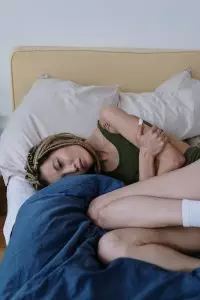
In addition to menstrual cramps and back pain during the period, some women experience other symptoms of dysmenorrhea, including:
Some women also experience vaginal cramps or ovary pain during period. This may be due to inflammation or scar tissue around the ovaries or ovarian cysts swelling.
How to Help Period Cramps
Generally, doctors will treat dysmenorrhea OTC pain medication, or NSAIDs like Ibuprofen, to relieve menstrual cramping due to primary dysmenorrhea. They may prescribe hormonal birth control, such as oral contraceptives (birth control pills), birth control patch, birth control implant, injection, or vaginal ring.
Hormonal birth control helps relieve period pain because it blocks ovulation and reduces the amount of prostaglandins being produced. However, this medication is not particularly helpful for those who may wish to get pregnant, or those who experience unpleasant side effects from birth control.
Possible Side Effects of Hormonal Birth Control
Many people may find that hormonal birth control causes side effects such as:
Potentially serious side effects may be more common the older a woman is, or the longer she remains on birth control; these could include: blood clots, gallbladder disease, heart disease, or even stroke.
If severe menstrual cramps are not relieved with pain medication, further investigation may be done to determine if there is some other condition causing pelvic pain.
Endometriosis is also usually treated with pain medications and contraceptives, or with Nupron, which suppresses the period. In severe cases, surgery may remove the patches of endometrial tissues. However, with both of these treatments, the endometriosis and severe period pain often come back.
Birth control, pain medications, and even surgeries may temporarily reduce painful cramps, but they are only masking the deeper problems. TCM and acupuncture can help get rid of menstrual cramps because they address the root cause of the pain.
Can Acupuncture Help Get Rid of Period Cramps?

In TCM, we look at organ systems as working together in harmony. Pain usually occurs because there is some imbalance in one or more of the major organ systems. Dysmenorrhea is usually considered to be related to Qi and/or blood stagnation, and often a deficiency of the kidney, liver, or both. In TCM, the liver controls the storage and distribution of blood, so it is central to the process of menstruation.
Dampness and cold are pathogenic forces that can be disruptive to the smooth flow of Qi related to menstruation. Being in a cold, damp place or eating too many cold or damp foods can cause blood stagnation in the abdominal area that leads to painful cramps.
Emotions can also play a significant role, as in TCM we see feelings of anger or depression causing liver stagnation. Deficiency of Qi can happen when a woman has gone through a lot, emotionally and physically, possibly through giving birth, or having stresses put on the reproductive organs.
Scientific research has shown that acupuncture has an effect on the production of key hormones like serotonin, estrogen and progesterone. When we use acupuncture points to balance the function of the liver, kidney, and other organ systems, these chemical changes occur naturally. We also use herbs to get vital nutrients into the blood that we can’t get from food.
Acupuncture is effective for treating conditions like endometriosis, uterine fibroids, ovarian cysts, and PCOS, as well.
Acupuncture treatment and herbal remedies for endometriosis and fibroids have been shown to reduce prostaglandin levels, which helps to relieve painful cramping and also to regulate cycles.
A study of endometriosis patients with dysmenorrhea who received electroacupuncture, the cure rate was 94.4% with low recurrence at the one-year checkup. Another study found that auricular acupuncture was effective 91% for mild to moderate menstrual pain.
TCM herbal formulations have been shown to be highly effective at relieving period pain. They work on the TCM principles of removing blood stasis to reduce swelling and relieve painful cramps.
When we are working to influence the menstrual cycle—in this case, to relieve painful cramping—it is usually best to have acupuncture treatment regularly for about three months. This way, we have time to balance the hormone fluctuations that occur during each phase of the cycle.
Top 3 Tips for Natural Relief from Period Cramps
Your acupuncturist can help give you personalized nutrition advice to help with your unique situation. Most people who are having trouble with painful periods can help themelves by trying these tips:
- Get more Omega-3 fatty acids in your diet – good natural sources include fish, flax seeds, and walnuts. You can also try taking fish oil, cod liver oil, or a vegan omega-3 supplement.
- Reduce consumption of ice-cold foods and beverages – icy drinks, ice cream, and raw foods can all cause a cooling of the uterus, which contributes to painful cramps.
- Avoid mucus-producing foods – foods that are more difficult to digest lead to mucus and stagnation in the organs. Reduce fatty foods, fried foods, and red meat.
Acupuncture Near Me for Dysmenorrhea in Los Angeles, Santa Monica
TCM has been used to treat menstrual difficulties and all types of gynecological issues for many centuries. The doctors at Art of Wellness in West L.A. bring special expertise in both TCM and western medicine gynecology and have partnered with the top women’s health and fertility specialists in Los Angeles. We have over 30 years of experience helping people regulate their menstrual cycles and experience more comfortable periods.
*This article is for education from the perspective of Traditional Chinese Medicine only. The education provided by this article is not approved by FDA to diagnose, prevent, treat and cure human diseases. It should not stop you from consulting with your physician for your medical conditions. Traditional Chinese Medicine is based on Qi, which is an invisible force that usually cannot be observed by modern science. Because science focuses on testing ideas about the natural world with evidence obtained through observation, these aspects of acupuncture can’t be studied by science. Therefore acupuncture and Chinese herbs are often not supported by double-blind, randomized trials, and they are considered alternative medicine therapies in the United States.